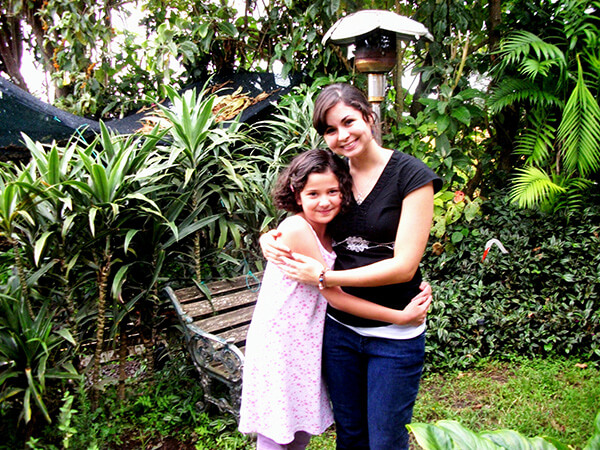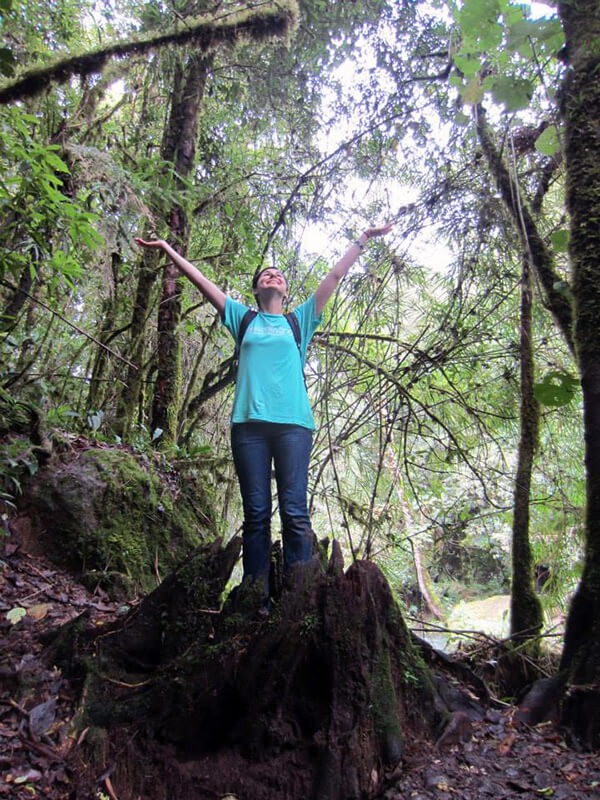How and Why to Fund Your Study Abroad
Being Broke and in College Need Not Prevent Affordable Education Overseas
Article and photos by Ashleigh Bugg
Resources updated 3/21/2024 by Transitions Abroad

|
|
Study abroad is achievable for all students with the right tips and resources.
|
“Sometimes,” my father said. “You have to jump off the edge of the world.”
I was leaving for a semester in Costa Rica and Nicaragua with the Latin American Studies Program. I hadn’t left the United States for more than a week, my Spanish was strictly Tex-Mex menu, and people in my hometown thought Costa Rica was an island inhabited by dinosaurs. I was a long way from comfort.
I said goodbye, boarded the plane, and jumped.
My semester abroad disturbed my life in the best ways. I met students and neighbors from diverse communities. My host father, Lidio, taught me street slang and how to use a machete to hack underbrush as we gathered vegetables on his mountain farm. My host sisters reminded me what being part of a family was like as we planted chilies or walked to the neighborhood panadería (bakery). I spent my weekends climbing mountains, visiting rainforests, and tasting strange but sweet fruit that reminded me of spiky dinosaur eggs.

|
|
Relationships with host families are one of the best parts of study abroad.
|
I uncovered privileges and fears. I watched my host parents in Nicaragua struggle through factory jobs with long work hours, low pay, and harsh overseers. I saw the clothing they arduously produced in Nicaragua sent to the United States to be sold at a cheap price that didn’t reflect their salaries. I heard the gunshots as my host brother was nearly shot on the street and watched my host mom pray for my younger brother’s intestinal worms to go away.
I learned failure wasn’t only possible but mandatory if I wanted to communicate with anyone. I told my host sisters I put mantequilla (butter) on my eyelids rather than maquillaje (makeup). I quickly found out preservantes (preservatives) and preservativos (condoms) were not the same things.
I explored every region of the country, from the mountains and cathedrals of Cartago to the beaches of Guanacaste, from the indigenous farms of Puerto Limó to the city neighborhoods of San José. I danced to Afro-Caribbean music along the Caribbean Sea, fulfilled my childhood dream of climbing a volcano, and bought my own machete to take home. The semester was worth every dollar spent and course taken.

|
|
Exploring the biodiversity of my host country on a weekend off from school.
|

|
|
While studying abroad, I got to fulfill my dream of climbing a volcano.
|
Why I Chose to Study Abroad
I had two options. I could learn Spanish grammar sitting in a classroom in Texas. Or I could live with three host families, use Pachuca slang on the winding streets of San José, and take my time learning the customs of Latin America. The programs cost the same. They would both fulfill the requirements for a Spanish minor. But I knew I would not learn Spanish unless I walked with the people who spoke it. I would not understand until I knew little about their history and my role in their reality, in their homes.

|
|
Studying abroad is a great way to learn a language and regional slang. Pura Vida is a term in Costa Rica that means pure life or no worries.
|
I interviewed dozens of students who had studied abroad, and no one regretted their decision to learn overseas. However, according to Institute of International Education, 10 percent of U.S. students will study abroad in their college careers. My university's statistics are much lower, with 5 percent choosing to learn away from campus.
Why Do So Few Students Choose to Study Abroad?
The biggest challenge students cite is money. Everyone I interviewed desired to study abroad, but most said they couldn’t afford it. Students do not realize the resources and opportunities available to them.
How to Fund Your Summer, Semester or Year Abroad
Step 1: Use your university’s financial aid and scholarships
How I did it:
I was skeptical about my ability to study Spanish overseas, believing it would cost more money than my financial aid could handle. This can be true for some programs. Some courses cost thousands more than a semester at home. However, I talked to my financial aid adviser. I realized a semester in Costa Rica costs the same as a semester at my university in Texas. I had to pay for extra expenses like the flight and souvenirs. Nevertheless, I learned Spanish in the context of a country that spoke it, stayed with host families who welcomed me into their lives and bonded with people who taught me a little bit more about how I wanted to spend my life.
How you can do it:
Students should begin by talking to their study abroad advisor. Students need to get ideas about the program(s) most appropriate for their career goals and ensure that the credit will transfer to their original course plan. Students should seek out available programs while remembering to budget for essential costs such as flight/transportation, housing, food, travel insurance, etc.
Assume a student attends a university or college like mine without dedicated study abroad advisors. In that case, they should speak to a faculty member who has previously taken students overseas. They can research if their university has study-abroad partnerships. My university was part of the Council of Christian Colleges, which has partnerships with programs in England, India, Uganda, and Costa Rica.
After getting an idea of the cost, students should present their findings to their financial aid advisor. The advisor might not understand the logistics of the actual program, like where they’ll live or what they’ll eat. Nonetheless, if they have a solid budget, they can help students make the best use of existing grants, scholarships, and financial aid. A common misconception among students is that they will lose their financial aid if they study abroad. However, according to Title IV of the Higher Education Act, students will receive financial assistance if their school approves the program; they are full-time students and will earn credit that applies to their degrees.
When talking with advisors, students should ask about scholarships and fellowships. Some universities have scholarships specifically for study abroad, while others have more general scholarships that can be used. A great resource is classmates who have studied abroad in the past. Before I went to Costa Rica, I reached out to students who had gone the year before. They explained how much I needed to budget and how I could use scholarships and aid.
Step 2: Use the power of crowdfunding and local sponsorship
Using the outreach capabilities of social media, travelers can share their ideas for trips and generate donations from friends, family, and supporters. On some crowdfunding sites, students will offer incentives for people to donate. For example, if someone donates $10 to a student’s trip, she will send him a postcard from her journey. This can be a good way for students to share their experiences with loved ones while raising funds.
Examples of Crowdfunding Websites
FundMyTravel
At FundMyTravel, students create a customizable campaign that highlights their destination, program type, and reasons for wanting to travel. Students will set an overall goal amount and specific itemized goals towards which donors may contribute. They can post updates, insert videos, and link their campaigns to social media channels. FundMyTravel is run by members with backgrounds in international education who want to help students from all backgrounds study abroad.
Local Sponsorships
Often, local businesses and organizations offer scholarships. Clubs like Rotary International, the Lions Club, and Kiwanis have scholarships for community members to represent the club abroad. My cousin is currently studying abroad in Denmark using a Rotary scholarship. I used a scholarship from my county’s electric company. Students can seek out the clubs in their districts and see if they have resources available.
Step 3: Teach or Conduct Research Abroad
Programs like the Fulbright Scholarship might be classified as something other than study abroad. Nevertheless, they’ll pay for travel and living expenses in another country. Students may work with their university to teach or conduct research after graduation, possibly earning credit. The Fulbright Scholarship is a valuable program for seniors who want to travel before heading to graduate school or the workforce. My cousin used this scholarship for research in Columbia and has traveled to dozens of countries to teach.
The Fulbright Scholarship comes in the form of two grants:
-
This research grant, lasting eight to 12 months, is available in 160 countries. It focuses on independent research or arts projects overseas.
-
The English Teaching Assistantship lasts eight to 12 months and is available in 75 countries. Participants teach English and U.S. culture in local classrooms.
Students should pick a country relevant to previous experience or future plans. It helps to choose a country that receives manageable applications. For instance, everyone applies to study in Spain, but fewer in adjacent Andorra. You can check the Fulbright website to see the availability of countries and get an idea of your chances.
Step 4: Research Scholarships and Fellowships outside your university
Many outside opportunities exist for students who need help finding scholarships through their university. The U.S. government and other organizations recognize the small percentage of students who study abroad and are funding initiatives to help underrepresented populations.
The Critical Language Scholarship Program is a “fully-funded language and cultural immersion program for American undergraduate and graduate students funded by the U.S. Department of State. The program is part of the U.S. initiative to increase the amount of students proficient in a foreign language. Students from a wide range of majors are encouraged to apply.”
The Benjamin A. Gilman International Scholarship Program aims to “diversify the kinds of students who study and intern abroad by offering awards to U.S. undergraduates who might otherwise not participate due to financial constraints.”
Is Study Abroad Worth It?
I think back to the girl standing with her parents at the airport. I wonder who she would be if she had finished her semester in Texas with family and friends.
She would most likely be happy. She would have a 4.0 GPA. She would not deal with the realities of her country’s interference in Latin America or the poverty levels in neighboring places. She would not have to come to terms with her own responsibility.
I imagined myself with the girl, offering the only advice I could give.
“Sometimes,” I would say, “You’re going to fail. You’re going to be homesick. You’re going to wonder what you’re doing so far from what’s familiar.”
She would ask if it is worth it.
I would think of my host families: Tica sisters, brothers, grandparents, aunts and uncles. I would think of the bus huffing up the hills and the strawberry man selling fruit on the corner. I remember walking through the mountain clouds and running with the sunrise along the beach. I would listen for the sounds of words never heard, moving with Tico time's slow but untiring pace. I would squeeze the girl’s shoulder and smile.
“Sometimes,” I would tell her. “You have to jump off the edge of the world.”
Ashleigh Bugg blogs about travel and culture at Travel Bugg.
|
